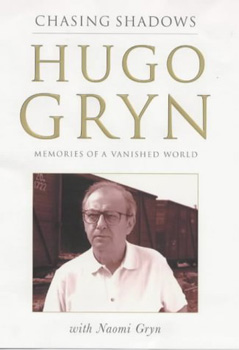 Chasing Shadows
Chasing Shadows
(Viking, 2000/Penguin, 2001)
Hugo Gryn was born in the Carpathian town of Berehovo, in what was then Czechoslovakia, in 1930. Berehovo was a fairly prosperous market town with a large Jewish community of which the Gryn family were active members. In 1938, the Hungarians moved in and the life of the town and the Gryn family changed for ever. In 1944, Hugo and his family were forced into the ghetto in Berehovo and six weeks later transported to Auschwitz. Separated from his mother and brother, Hugo and his father were used as slave labourers and were lucky to survive two death marches.
After liberation, Hugo Gryn returned home to find a town whose vibrant Jewish community had been destroyed, a town where there remained only 'a small handful of survivors, dispirited, most of them waiting in vain for the return of other members of their families. Miraculously, one of those survivors was his mother; he brought her the tragic news that his father had died just a few days after the arrival of Allied troops.
In 1951, while training in Cincinnati to become a rabbi, Gryn started writing about his experiences in the camps. Though he abandoned the narrative abruptly, the pages were discovered in a desk drawer by his daughter, Naomi. In 1989, she had persuaded him to make an emotional return to Berehovo to make a film about the experience; and later to begin writing about his childhood, family and experiences during the war.
These two pieces of writing, brought together and edited by Naomi Gryn, offers a compelling portrait of one of Britain's best-loved spiritual figures and broadcasters.
Reviews
‘Rabbi Hugo Gryn was well known as the genial contributor of Jewish wisdom to the Radio 4 programme The Moral Maze. Despite his bonhomie, no one had a deeper experience of human misery and human evil … This book is an essential witness to the horrors of the 20th century and also to the resilience of the human spirit’ Hyam Maccoby, Evening Standard
Gryn evokes a fabulous rural life in the Czech town of Berehovo where Jews and gentiles lived in mutual toleration … Auschwitz comes across as a wild and hellish circus … It is a brave act to have made this book happen, and one that gives Hugo Gryn’s saddened public a more complex sense of the man who was the People’s Rabbi’ Julia Pascal, Financial Times
‘This book should have as wide an audience as possible … It highlights the danger of revisionist accounts of the Holocaust and throws into relief the reality of individual suffering in ethnic cleansing. Most importantly, it shows, in Gryn’s words, that “Evil is real”. So is good. Much of this goodness is personified by Gryn himself’ Sherry Ashworth, Daily Telegraph
‘Gryn’s God is as fragile as a flickering flame, yet his belief still illuminates every page of this remarkable book – which is not only an important historical document and engrossing memoir, but the only convincing case for a belief in God that I have ever read’ Francis Gilbert, New Statesman
‘This powerful book makes a worthy memorial’ Matthew Reisz, Sunday Times
‘An inspiring memorial to the well-loved rabbi and broadcaster whose untimely death in 1996 was mourned so widely’ Emma Klein, Tablet
‘When Hugo Gryn knew he was dying of cancer he continued to broadcast on the Radio 4 programme The Moral Maze, of which he was the undoubted star, and to fulfil his function as a revered and leading London Rabbi. He lived with zest even up to the end because he so easily might have died some fifty years earlier in Auschwitz … Now, thanks to his devoted daughter Naomi, we have his testament … Everyone should read this book. In the moral maze of life he was a guide to give thanks for’ Peter Lewis, Daily Mail
‘A work of desperate and resolute honesty by a clear-eyed witness with something important to say, producing an account at once grim and full of life, angry but never sour’ J.B. Pick, Scotsman
‘Gryn’s greatest achievement is that he witnessed the worst of man’s inhumanity to man and yet emerged from these experiences with a determination to do good … When asked [by his daughter] how he would like the legacy of the Holocaust to be remembered he told her: “Try to convey that you come from a beautiful world. It was hard-working, it prized learning, the gifts of the spirit and intellect. It was in fact civilized.’ This posthumous memoir, lovingly edited by Naomi, is a befitting response to her father’s request’ Louise Harrison, Literary Review
‘Thanks to this book, Rabbi Hugo Gryn will help to bring reality back to a story that has come, for many, to seem almost theoretical … In the conclusion to this book he writes that he often asked “Where was God in Auschwitz?” but he doesn’t give any of the expected answers. He writes that “God was there himself – violated and blasphemed. The real question is where was man in Auschwitz?”’
Anne Applebaum, Sunday Telegraph